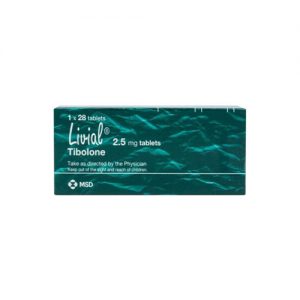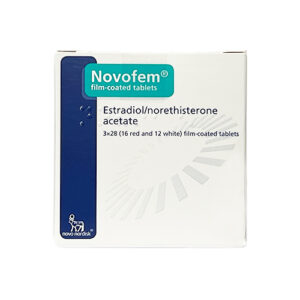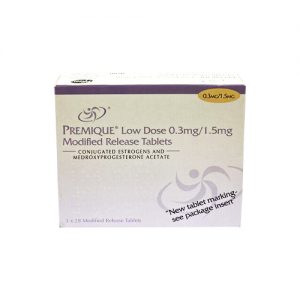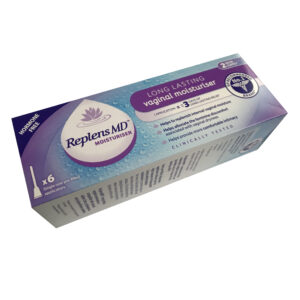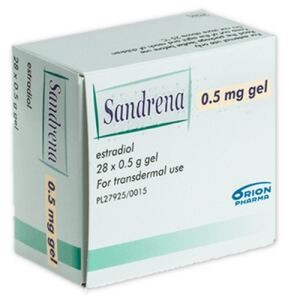Showing 16 products
Pagination
What is hormone replacement therapy?
Hormone replacement therapy (HRT) is used to treat the symptoms of the menopause.
Hormone Replacement Therapy (HRT) is a treatment used to supplement the body with either oestrogen alone or oestrogen and progesterone in combination. HRT is often used to treat common menopausal symptoms, including hot flashes and vaginal discomfort. In addition, HRT may also protect against osteoporosis.
HRT is also useful in preventing osteoporosis in premenopausal women and those with surgical menopause.
Hormone replacement therapy can be started as soon as you reach the menopause to treat its symptoms.
Menopausal symptoms that may benefit from HRT:
- Hot flushes
- Vaginal dryness/recurrent urine infections
- Urinary leaks
- Lack of libido and sex drive
- Reduce risk of osteoporosis
- Increased risk of osteoporosis
What is the menopause?
The menopause happens in most women in their mid 50s. There is a strong correlation with the maternal menopausal age.
During the menopause, the regular menstruation processes slows down, gets lighter then altogether ceases. The adjustment of the natural hormones within the body produce the above listed symptoms. The symptoms can be persistent for an average of 5 years and in 1 in 12 women they last for upto 12 years. It should be noted that not all women experience troubling menopausal symptoms.
Typical symptoms associated with the menopause:
- Change to your period
- Hot flushes
- Night sweats
- Loss of libido (sex drive)
- Vaginal dryness
- Vaginal itching
- Recurrent urinary tract infections
- Discomfort or pain during sex
- Osteopenia/osteoporosis
- Mood swings
- Anxiety
- Palpitations of the heart
- Joint swelling and pain
The rationale for HRT is to replace the female hormones lost during the menopause, this in turn should provide relief from the above-mentioned symptoms.
Osteoporosis and the menopause
Osteoporosis weakens the bones thereby increasing the risk of bone fractures (occasionally from the slightest fall). The lack of oestrogen during the menopause is associated with osteoporosis, thereby supplementing the oestrogen (HRT) should help to preserve bone strength.
How does HRT work?
HRT helps to restore oestrogen levels within the body. Some HRT formulations also contain progesterone, this is thought to help maintain uterine health and reduce the risk of endometrial cancer.
How long does HRT take to work?
It can take a few weeks until you feel the initial impact of HRT, and up to 3 months to feel the full effects of this treatment. Some women find it takes a while for their bodies to get used to HRT, and you may experience some side effects while you adjust to this new treatment. For example, HRT can cause bloating, nausea and headaches, and you may even feel some joint pain after starting HRT, as well as back pain.
If you are still experiencing side effects more than 3 months after starting HRT, you may need to change the type or adjust the dosage.
What are the different types of HRT?
There are a number of different types of HRT available, and it’s a good idea to think about which one might work best for you.
HRT comes in several different forms, such as:
- Tablets
- Skin patches
- Oestrogen gel
- Implants
- Vaginal oestrogen
- Testosterone
Your individual treatment routine for HRT will depend on a number of different factors, including whether you’re in the early stages of menopause or if you’ve had menopause symptoms for a longer period of time.
There are 2 different types of HRT treatment routines - cyclical HRT and continuous combined HRT.
Cyclical HRT
Cyclical HRT is often recommended for women with menopausal symptoms but who still have periods and are taking combined HRT. There are two different types of cyclical HRT.
Monthly HRT
This type involves taking oestrogen every day and taking progesterone alongside it for the last 2 weeks of your menstrual cycle. This is usually recommended for women having regular periods.
3-monthly HRT
This type involves taking oestrogen every day, and taking progesterone alongside it for 14 days every 3 months. This is usually recommended for women with irregular periods.
Continuous cycle
Unlike cyclical HRT treatment, continuous cycle is recommended for postmenopausal women. Postmenopausal is considered to be when a woman has not had a period for 1 year.
Continuous cycle HRT treatment involves taking both oestrogen and progesterone every day without any breaks.
At Access Doctor, we offer a wide variety of HRT treatments, including cyclical HRT brands, as well as treatments in tablet form and patches.
How to take HRT?
How long can I take HRT for?
They can be taken until the symptoms of the menopause pass, however, It is not recommended to be taken for more than 5 years. However, if you are at low risk of complications some HRT products can be taken for longer.
It is recommended you gradually taper (lower your dose) slowly before coming off HRT altogether.
Does HRT provide contraceptive cover?
No, it is not a contraceptive method. It is recommended that you use contraceptive methods for two yours following your menopause to prevent unplanned pregnancies.
Is HRT suitable after a hysterectomy?
Yes, if you have menopausal symptoms it is still suitable for you. A full hysterectomy requires an oestrogen only product to be taken as there is no risk of uterine cancer.
A partial hysterectomy will require a combined (oestrogen and progesterone) product.
When completing the online consultation, accurately answer all your medical and surgical conditions, this will allow our doctors to review you request accurately and provide you with the best treatment option.
Precautions and side effects of HRT
Hormonal therapy is always prescribed with extra care and monitoring. Short term use (less than 10 years) of HRT has been associated with very few risks. Our doctors will assess your request thoroughly and only prescribe what is suitable for you. It is important for you to inform your own doctor (GP) regarding this treatment so they can regularly monitor you.
Long term use of HRT has been associated with increased risk of developing various cancers including breast, ovarian and uterine. HRT is also associated with clotting of your blood (thromboembolism) and therefore unsuitable for women with previous history of blood clots.
HRT is not recommended if you:
- Are pregnant
- Currently have or have previously suffered from breast cancer, ovarian cancer or uterine (womb) cancer
- Have or are at risk of blood clots
- Currently have or have previously suffered stroke or heart disease
- Have high blood pressure (untreated)
- Have liver disease
Can HRT make you feel worse?
As with the majority of medicines, the hormones used in HRT can cause side effects.
The main side effects of taking oestrogen can include:
- Bloating
- Breast swelling or tenderness
- Nausea
- Headaches
- Indigestion
- Leg cramps
- Vaginal bleeding
The main side effects of taking progesterone can include:
- Breast tenderness
- Headaches or migraines
- Acne
- Stomach pain
- Back pain
- Mood changes
- Depression
- Vaginal bleeding
The good news is that these symptoms should improve over time. You should try to continue with the treatment for a minimum of 3 months, however if any of these side effects continue for longer, or your symptoms are severe, you should speak to your doctor.
Does HRT cause weight gain?
It’s a common belief that HRT can cause weight gain. However, there is very little evidence to support this. It’s not uncommon to gain weight during the menopause, but this can happen regardless of whether you take HRT or not. Sticking to a regular exercise regime and eating a balanced diet will help you maintain a healthy weight.
Does HRT make you tired?
Some women report feeling tired while taking HRT. This can be due to the fact that the progesterone in HRT can cause premenstrual symptoms, including fatigue.
HRT treatment options
The primary aim of all HRT treatments is to improve oetrogens levels within the blood.
Various active ingredients are used such as:
Conjugated oestrogens
Tibolone
Oestradiol
Progestogens
HRT formulations contain various combinations of the above active ingredients. We provide a wide range of products including tablets and Patches. Click on individual medications to find out more.
Non-medical treatment
The menopausal period is extremely difficult for many women causing emotional, psychological and physical symptoms. Lifestyle modifications can help to cope with the symptoms.
For hot flushes/night sweats:
- Keeping the room temperature cool
- Regular cool showers
- Cold drink
- Wearing loose light cotton clothing
- Avoid spicy foods
- Reduce alcohol and caffeine intake
For a low libido:
- Relationship openness/discuss with your partner
- Foreplay
- Counselling
Vaginal dryness:
- Vaginal moisturisers
- Lubricants
Well being:
- Meditation
- Yoga
- Counselling
- Support network of family and friends
- Exercise
- Healthy diet
- Stop smoking
Why Consider Hormone Replacement Therapy?
The main reason women consider HRT is the onset of menopause, a natural part of ageing. Menopause, often termed the "change of life," generally occurs between the ages of 45 and 55, when a woman's ovaries stop producing eggs, and she is no longer able to become pregnant naturally.
Menopause can cause a variety of symptoms, some of which are quite uncomfortable or even debilitating. This is where HRT steps in, to alleviate these symptoms and improve the quality of life during this transitional phase.
What are the typical symptoms of menopause
Menopause is a natural biological process that marks the end of menstrual cycles and fertility in women. It's diagnosed after you've gone 12 months without a menstrual period. Menopause can happen in your 40s or 50s, but the average age is usually around 51.
Menopause can cause a variety of symptoms due to changes in hormone levels, particularly a decrease in oestrogen and progesterone. However, these symptoms can vary widely among women. Here's a more detailed look at some of the common symptoms:
1. Irregular Periods: This is often the first symptom; menstrual cycles may lengthen or shorten, and bleeding may become lighter or heavier. If your periods are very heavy or have blood clots, or if you have periods that last longer than seven days, you should seek medical advice.
2. Hot Flashes and Night Sweats: Hot flashes are common during menopause, and they're typically characterised by a sudden sensation of heat in the chest, face, and head followed by flushing, perspiration, and sometimes chills. Hot flashes can be as mild as a light blush or severe enough to wake you from a sound sleep (also known as night sweats).
3. Sleep Problems: Sleep problems are often due to night sweats, but sometimes sleep becomes unpredictable regardless of night sweats. You may have insomnia (trouble falling asleep), or you might wake up long before your usual wake-up time.
4. Mood Changes: Hormonal changes during menopause can make you feel unusually emotional or fatigued. Some women experience mood swings, irritability, or increased risk of depression.
5. Vaginal and Bladder Problems: Decreasing oestrogen levels can cause vaginal tissues to lose lubrication and elasticity, making intercourse painful. Changes in your urinary system can cause you to have the urge to urinate more frequently.
6. Decreased Libido: During menopause, sexual arousal and desire may change. But if you had satisfactory sexual intimacy before menopause, this will likely continue through perimenopause and beyond.
7. Changes in Body Odour: Due to hormonal changes, body odour can change during menopause. Some women may notice a more pronounced or different smell.
8. Physical Changes: You might gain weight, particularly around your waist. You could also lose muscle mass and see an increase in body fat. The skin may also become thinner and drier due to loss of elasticity.
9. Bone Loss: With declining oestrogen levels, you start to lose bone more quickly than you replace it, increasing your risk of osteoporosis — a disease that causes fragile bones.
Remember, every woman's experience with menopause can differ significantly. Some women go through menopause with few symptoms or problems, while others find menopausal symptoms debilitating. Many factors, including genetics and lifestyle, play a part in how your body experiences menopause.
Who can take HRT?
Hormone replacement therapy, commonly known as HRT, is a treatment option available to many women during menopause. It helps reduce menopausal symptoms such as hot flashes and night sweats. Generally speaking, any woman who is experiencing menopausal symptoms can be considered for HRT. However, certain medical conditions can disqualify a woman from taking HRT. For instance, if she has or had breast cancer, ovarian cancer, womb cancer or has suffered from blood clots in the past then this may prevent her from being eligible for HRT. Additionally, untreated high blood pressure could also greatly decrease her chances of being prescribed HRT; her blood pressure needs to be under control before she can start it. Finally, women with liver disease are not usually recommended to take hormone replacement therapy either.
It should be noted that even if a woman is medically fit and able to take HRT does not guarantee that she will do so; consulting with your healthcare professional is advised to make sure you understand all the pros and cons associated with it before taking the plunge into using it as a form of treatment for menopause-related symptoms.
Hormone replacement therapy (HRT) is commonly prescribed for women suffering from the hormonal symptoms of menopause. This can include hot flashes, night sweats, insomnia and vaginal dryness. HRT helps to reduce these uncomfortable symptoms by supplementing depleted levels of oestrogen and progesterone in the body. For most women, HRT is an effective way to manage their menopausal symptoms.
However, there are some cases where HRT may be either inappropriate or unsuitable. Women with a history of breast cancer, ovarian cancer or womb cancer should not take HRT as it might cause their condition to worsen. Likewise if you have a history of blood clots, high blood pressure or liver disease you should talk to a healthcare professional before commencing HRT to ensure any necessary steps are taken before beginning treatment. Always consult with your doctor before deciding on whether hormone therapy is right for you so you can weigh up the risks and potential benefits of taking HRT against your medical history and health needs.
What are the types of Hormone Replacement Therapy (HRT) available?
HRT replenishes the body's oestrogen, in combination with progesterone for women who still have their uterus. There are different types of HRT available, which can be tailored to fit an individual's specific needs and circumstances. Here are the key types:
1. Oestrogen-Only HRT: This type of HRT involves taking oestrogen without progesterone. It's usually recommended for women who have had a hysterectomy (surgery to remove the uterus). Oestrogen can be taken in the form of tablets, skin patches, gels or a vaginal ring, cream, or pessary.
2. Combined HRT: This includes both oestrogen and progestogen, and it's generally recommended for women who still have their uterus. Taking oestrogen alone can thicken the lining of the uterus and increase the risk of endometrial cancer. Progestogen helps to counteract this risk. There are two types of combined HRT:
Continuous combined therapy: Both oestrogen and progestogen are taken every day without a break.
Cyclical or sequential HRT: This is often recommended for women experiencing menopausal symptoms but are still having periods. There are two types of cyclical HRT:
Monthly cyclical HRT, or sequential combined HRT, where you take oestrogen every day, and progestogen at the end of your menstrual cycle, for the last 14 days.
Three-monthly cyclical HRT, where you take oestrogen every day, and progestogen alongside it for 14 days, every 13 weeks.
3. Local oestrogen: For women experiencing primarily vaginal symptoms of menopause, oestrogen can be administered locally with a vaginal tablet, cream, or ring. This form of treatment has the advantage of being directed right at the source of the symptoms, usually involving lower doses of oestrogen than systemic forms of HRT.
4. Tibolone: Tibolone is a synthetic hormone that acts like oestrogen and progesterone in the body. It's often used in women who find other types of HRT ineffective or unsuitable.
Testosterone gel for reduced sex drive
Testosterone gel or cream is a treatment option for those women whose sex drive does not return after hormone replacement therapy. The idea is that it can help to restore diminished energy levels, mood and, most importantly, increased sexual desire.
Testosterone is naturally produced by the ovaries but tends to decline with age and many other life stages such as post-menopausal experience. Although it is currently unlicensed in women, specialist doctors may prescribe it if they believe that it would be beneficial for their patient's quality of life. Moreover, testosterone can easily be taken at the same time as HRT without putting your health at risk.
However, like any medication there are some side effects to consider before taking testosterone gel or cream - such as acne breakouts and an increase in unwanted hair growth. It is important to consult your doctor and fully understand the consequences of using supplementation in order to make an informed decision about this treatment option for restoring lost libido.
Osteoporosis and the menopaus
Osteoporosis weakens the bones thereby increasing the risk of bone fractures (occasionally from the slightest fall). The lack of oestrogen during the menopause is associated with osteoporosis, thereby supplementing the oestrogen (HRT) should help to preserve bone strength.
What are the benefits associated with using Hormone Replacement Therapy?
As with any treatment, there are potential benefits and risks associated with its use. Understanding these can help individuals make informed decisions about whether HRT is right for them.
Benefits of Hormone Replacement Therapy
- Relief from Menopausal Symptoms: HRT is highly effective at relieving common menopausal symptoms, such as hot flashes, night sweats, vaginal dryness, itching, and discomfort during sex.
- Bone Health: oestrogen is vital for maintaining bone density. Women going through menopause experience a decline in oestrogen levels, which can lead to bone loss and increased risk of osteoporosis. HRT can slow this bone loss and decrease the risk of fractures.
- Heart Health: Some research suggests that when HRT is initiated early in the postmenopausal period, it may reduce the risk of heart disease. However, this is a topic of ongoing debate and research.
- Mood Improvement: For some women, HRT can help manage mood swings and improve overall mood, thereby improving the quality of life.
- Skin and Hair Health: Some evidence suggests that HRT can increase skin thickness and elasticity, decrease wrinkles, and improve hair health. However, these should not be the primary reasons to initiate HRT.
Can HRT make you feel worse?
As with the majority of medicines, the hormones used in HRT can cause side effects.
The main side effects of taking oestrogen can include:
· Bloating
· Breast swelling or tenderness
· Nausea
· Headaches
· Indigestion
· Leg cramps
· Vaginal bleeding
The main side effects of taking progesterone can include:
· Breast tenderness
· Headaches or migraines
· Acne
· Stomach pain
· Back pain
· Mood changes
· Depression
· Vaginal bleeding
The good news is that these symptoms should improve over time. You should try to continue with the treatment for a minimum of 3 months, however if any of these side effects continue for longer, or your symptoms are severe, you should speak to your doctor.
What are the most common risks associated with using Hormone Replacement Therapy?
Breast Cancer: Some forms of HRT can increase the risk of breast cancer. The risk is dependent on the duration of treatment, with longer use leading to higher risk.
Cardiovascular Issues: HRT can increase the risk of blood clots, stroke, and in some cases, heart disease, particularly in women who start HRT more than 10-20 years after menopause or after age 60.
Endometrial Cancer: oestrogen-only HRT can increase the risk of endometrial cancer (cancer of the uterine lining). However, this risk is mostly mitigated when a form of progesterone is added in women who still have their uterus.
Ovarian Cancer: Some studies have suggested a slight increase in the risk of ovarian cancer with HRT use. However, the absolute risk is considered small.
Gallbladder Disease: HRT may increase the likelihood of developing gallstones and inflammation of the gallbladder.
It's important to note that the decision to use HRT should be made on an individual basis after discussing with your healthcare provider. The benefits and risks can vary depending on several factors, including your age, your time since menopause, your risk of certain diseases (like cancer, heart disease, or osteoporosis), and your menopausal symptoms' severity.
At what age is HRT most effective?
The effectiveness of HRT can vary depending on the age at which it is started. Starting HRT closer to the onset of menopause (perimenopause) or early menopause (within a few years of the last menstrual period) can provide the most benefits. This is because the hormone levels are still in a state of transition, and introducing hormones through HRT can help alleviate symptoms and provide a smoother hormonal transition. HRT at this stage can effectively reduce hot flashes, night sweats, vaginal dryness, and mood changes.
However, it's important to note that HRT can be beneficial even if started later in menopause. It can still alleviate symptoms, improve quality of life, and offer protection against osteoporosis and fractures. While the benefits may be less pronounced compared to starting HRT earlier, it can still provide relief and improve well-being.
Is HRT suitable after a hysterectomy?
Yes, if you have menopausal symptoms, it is still suitable for you. A full hysterectomy requires an oestrogen only product to be taken as there is no risk of uterine cancer.
A partial hysterectomy will require a combined (oestrogen and progesterone) product.
When completing the online consultation, accurately answer all your medical and surgical conditions, this will allow our doctors to review you request accurately and provide you with the best treatment option.
Does HRT cause weight gain?
It’s a common belief that HRT can cause weight gain. However, there is very little evidence to support this. It’s not uncommon to gain weight during the menopause, but this can happen regardless of whether you take HRT or not. Sticking to a regular exercise regime and eating a balanced diet will help you maintain a healthy weight.
Does HRT make you tired?
Some women report feeling tired while taking HRT. This can be due to the fact that the progesterone in HRT can cause premenstrual symptoms, including fatigue.
Which HRT is the lowest risk?
The risk profile of different HRT options depends on the type of hormones used and the method of administration. In general, transdermal oestrogen (such as patches, gels, or creams applied to the skin) and micronized progesterone are considered to have a lower risk profile compared to oral oestrogen and synthetic progestins.
Transdermal oestrogen bypasses the liver, leading to lower levels of clotting factors and markers associated with cardiovascular risks. Micronized progesterone is considered to have a more favourable risk profile compared to synthetic progestins, as it is structurally identical to the progesterone naturally produced by the body. Synthetic progestins, on the other hand, have been associated with a slightly higher risk of certain adverse effects, such as blood clots and cardiovascular issues.
However, it's important to discuss the risks and benefits of different HRT options with a healthcare professional. Factors such as your medical history, individual risk factors, and personal preferences should be taken into account when determining the most suitable and lowest-risk HRT option for you.
What is the best HRT treatment for early menopause
The best HRT treatment for early menopause depends on various factors, including your symptoms, medical history, and personal preferences. Oestrogen therapy is commonly used to alleviate symptoms of early menopause. The specific type and dose of oestrogen can vary depending on individual needs.
If you have a uterus, it's important to protect the uterine lining by combining oestrogen with progesterone. This helps reduce the risk of endometrial hyperplasia (overgrowth of the uterine lining), which can potentially lead to uterine cancer. Micronized progesterone is often recommended in this case, as it is structurally identical to the progesterone produced by the body and is less likely to cause adverse effects.
The specific treatment plan should be determined in consultation with a healthcare professional who can evaluate your individual situation, take into account any other existing health conditions, and provide personalized recommendations.
Hormone replacement therapy typically involves the administration of oestrogen and progesterone (or a progestin, which is a synthetic version of progesterone). In some cases, only oestrogen is prescribed, particularly for individuals who have undergone a hysterectomy (removal of the uterus). Testosterone may also be included in certain cases, such as for individuals transitioning from male to female.
Oestrogen is the primary hormone used in HRT. It helps alleviate menopausal symptoms, such as hot flashes, night sweats, vaginal dryness, and mood changes. It also plays a crucial role in maintaining bone density and cardiovascular health.
Progesterone (or a progestin) is typically added to HRT for individuals who have a uterus. It helps protect the uterine lining from overgrowth, reducing the risk of endometrial hyperplasia and uterine cancer. Progesterone can also help regulate the menstrual cycle.
How long after starting HRT do you feel a difference?
The effects of hormone replacement therapy (HRT) can vary from person to person, and the timeline for experiencing noticeable changes can also differ. Generally, it takes time for hormone levels to reach appropriate levels and for the body to respond to the new hormonal balance. Some individuals may start noticing subtle changes within a few weeks, while for others, it may take several months.
Here is a rough timeline of some potential changes that can occur with HRT, although it's important to note that individual experiences may vary:
1. First few weeks: You may experience some initial emotional changes, such as improved mood or mental clarity. There might also be some minor physical changes like softening of the skin or reduced oiliness.
2. First few months: Changes can become more noticeable during this period. Some individuals may experience breast tenderness or growth, as well as a reduction in testicular volume. Body fat redistribution may start occurring, resulting in a more feminine or masculine shape, depending on the desired direction of transition. Facial and body hair growth may slow down, and some individuals might notice a decrease in libido.
3. First six months to one year: Further breast development is expected, and body fat redistribution continues. Skin may become softer and smoother. Facial and body hair might continue to thin, although it may not completely disappear without additional hair removal methods. Voice changes, if desired, may require vocal training and practice.
It's important to remember that these changes are general guidelines, and individual experiences may vary. The specific medication, dosage, and route of administration can also influence the timeline and extent of changes. Regular monitoring and communication with a knowledgeable healthcare provider experienced in transgender healthcare is crucial to ensure safe and effective HRT and to address any concerns or questions along the way.
Stopping HRT
When deciding to take hormone replacement therapy (HRT), it is important to remember that there is no limit on how long you can take. Usually, women will stop taking the medication when their menopausal symptoms pass, after a few years. It is important to consult a GP or doctor before taking HRT and understand the risks associated with particular forms of treatment. Women who use HRT for more than 1 year have an increased risk of breast cancer compared to those who never have used HRT. Although this risk decreases after stopping HRT, some increased risk may remain for up to 10 years when compared to women who have not used it at all.
When deciding to stop taking HRT, one can choose either a sudden or a gradual approach depending on personal preference and symptoms. It should also be noted that any discontinuation in certain types of medications requires approval from a doctor first as the body may need time to readjust accordingly. Ultimately, the decision of whether or not one should start or stop using HRT and its duration must be made between patient and physician through open dialogue about potential risks and benefits.
Non-medical treatments
The menopausal period is extremely difficult for many women causing emotional, psychological and physical symptoms. Lifestyle modifications can help to cope with the symptoms.
For hot flushes/night sweats:
· Keeping the room temperature cool
· Regular cool showers
· Cold drink
· Wearing loose light cotton clothing
· Avoid spicy foods
· Reduce alcohol and caffeine intake
For a low libido:
· Relationship openness/discuss with your partner
· Foreplay
· Counselling
Vaginal dryness:
· Vaginal moisturisers
· Lubricants
Well being:
· Meditation
· Yoga
· Counselling
· Support network of family and friends
· Exercise
· Healthy diet
· Stop smoking
Is it safe to buy HRT from an online pharmacy such as Access Doctor?
Hormone replacement therapy is a highly individualised treatment and isn't the right choice for every woman. The decision to use HRT should be made with your GP or doctor after considering your health history, the severity of your symptoms, and your individual risk of heart disease, breast cancer, and other conditions.
At Access Doctor, we are here to help you maintain and manage your HRT treatment without unwanted delays.
When you order your treatment with us for the first time, we require you to provide evidence that your own GP has assessed you and started a HRT treatment plan that is safe and suitable for you. This proof can be in the form of a repeat prescription copy, or treatment package label clearly showing your full name as well as the treatment and dosage details. We are then happy to continue prescribing the treatment for you and will write to your GP periodically to inform them of our service, and to maintain our continuity of care for you.




We’re here to help.
Our friendly team is available to help Monday to Friday 9:00am - 5:00pm.
If you need urgent assistance, do not use this service. Call 111, or in an emergency call 999.











